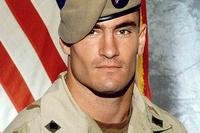The ambush came early -- a salvo of gunfire and rocket-propelled grenade explosions that caught a small outpost of U.S. Marines by surprise.
One of the first to be wounded was a Marine from Travis Beeman's platoon. The young warrior was shot in the chest, Beeman said, but the injured man's first inclination was to keep on fighting.
"Just give me my gun," the Navy Corpsman recalls his comrade insisting as enemy bullets continued to zip by. It didn't take long, though, for grit to turn to panic. "He looked up at me and said, 'Doc, I don't want to die.'"
Beeman starts his studies at Utah's Westminster College this semester knowing that his perspectives on life were inexorably changed on Afghanistan's battlefields -- but not yet sure how his time at war will affect his experiences in the classroom.
He's not alone. More than 460,000 Iraq and Afghanistan war-era veterans are expected to take advantage of significantly expanded G.I. Bill benefits this year, an estimated increase of 25 percent over years past.
In Utah, college officials say the influx of veteran students could appreciably alter institutions that, by their very nature, are far removed from the realities of war.
'Honor, courage and mortality' -- Beeman still isn't sure how the Marine managed to survive his gunshot wound.
"It's a miracle, really," the Holladay native said. "This guy got hit in the chest, but we later found out
the bullet entered at his ribs, wrapped around his ribcage and went out his back. It missed every organ."
At the time, though, Beeman could only say, "I'm here. I'm going to help you," as the Marine pled for his life.
Beeman doesn't expect anyone who has not been to war to be able to relate to his experience. And the 1999 Olympus High School graduate knows he might have trouble relating to his fellow freshmen -- 97 percent of whom will be arriving at the small liberal arts college straight out of high school.
"You know, most of my friends are done with school," Beeman said. "They have their degrees. Some of them have their master's degrees. And I'm just starting."
Richard Badenhausen doesn't see that as a disadvantage. The director of Westminster's Honors Program sees enormous potential in students like Beeman.
Badenhausen, whose classes include seminars in war literature and trauma studies, said combat veterans bring sophisticated perspectives to otherwise theoretical discussions.
"We talk about concepts like honor, courage and mortality ... in many cases these are abstract ideas for people coming right out of high school."
But to those who have served at war, Badenhausen said, "these are questions they've actually struggled with."
Weber State University communications professor Sheree Josephson has seen the impact that a veteran's perspective can have on fellow students. A few years back, during a class discussion on communications law, her students debated the merits of wartime censorship against the principle of free speech.
Army veteran Eric Turner presented the class with a variety of military recruiting advertisements -- juxtaposed with images from war.
"It was eye-opening," Josephson said. "To bring it home like that -- from someone who had been there and seen those things -- it was very powerful."
Badenhausen said veterans often feel more entitled than younger peers to question the person standing at the lectern. "I encourage students to challenge what I say because that is very helpful and leads to learning," he said.
'Taking off the uniform' -- The first G.I. Bill was signed by President Franklin D. Roosevelt in 1944. Among those who benefited was Stanley Dunham, a U.S. Army supply sergeant who served in Europe and the Pacific during World War II.
Dunham, who had been expelled from high school for punching the principal in the nose, might never had attended college if it hadn't been for the way a grateful nation decided to repay his service.
And if Dunham hadn't gotten that second chance, "I wouldn't be standing here today," the soldier's grandson, President Barack Obama, said as he announced the start of the new bill.
Eight million veterans took advantage of the first G.I. Bill. By 1947, about half of college students were veterans.
By contrast, only about 4 percent of college students were veterans last year. And while the new bill won't increase veteran enrollment anywhere near those historic levels, Badenhausen believes one key effect of the 1944 bill will continue.
"The brilliance of the original bill was that it gave veterans a specific path back into society," he said.
The military, he noted, trains its members "to close off aspects of themselves that in some ways make them human. They are taught to obey, not to question, how to kill. In spite of what recruiting efforts would have you believe, these are not great qualities to help you survive in society."
Education, Badenhausen said, "is about establishing your identity, taking off the uniform, asking questions."
So for veterans striving to "come home" from combat, he said, college might be a good bridge from the warfront to the homefront.
Even with that bridge, though, some will struggle.
After a tour of duty in Iraq's volatile Anbar Province, former Marine Joshua Isbell was excited to study at Salt Lake Community College.
But after being away from school for so long -- and given his battle with post-traumatic stress disorder -- Isbell said college "felt stressful and awkward."
"I hated everyone -- I thought they were all stupid," Isbell said. "And everyone got on my nerves. I didn't have a lot of patience."
Two years later, Isbell is one of 100 veterans who have received scholarships to Westminster under the federal Yellow Ribbon program, in which private universities share the cost of a veteran's tuition with the government.
Isbell is eagerly anticipating getting involved in classes at Westminster. "It took two years," he said. "But it's not so bad for me anymore."
'A completely different kind of experience' -- Forty-five miles south, at Brigham Young University, officials expect an increase of more than 30 percent in veteran enrollment over last year. In preparation, six psychologists have been given training in post-traumatic stress treatment. The school also will offer other services to help veterans adjust to civilian life.
At the University of Utah, enrollment officials processed veterans benefits paperwork for 427 students last year. This year the number will likely top 500, said university registrar Tim Ebner.
Higher education officials say that jumps in enrollment of 20 percent and 30 percent among such specific groups of students are unheard of. The new G.I. Bill is so different from previous programs that it has been difficult to predict exact increases, "other than this would be big," Ebner said.
Utah Dean of Students Annie Nebeker Christensen said more than 70 staff members in the university's student affairs office have received specialized training in assisting veterans. The university is also seeking advice from the neighboring Veterans Affairs Medical Center.
On top of physical and mental disabilities, veterans often come to college with other responsibilities -- including debt, spouses and children -- that traditional students don't have.
That can make them even more focused on graduation than their younger peers, said JoAnn Embry, who works with former military members at BYU. She believes the new bill -- which offers increased tuition payments, $1,000 for books and a monthly housing stipend -- will be a big help.
Instead of working to pay for their education, she said, "they can put some more time into their studies so that they can get through school quicker."
'You're going to see ... a maturity' -- Veterans are also more likely to be first-generation college students and to have had less academic success in high school than their college colleagues. Advocates lament that even though education is the top reason enlistees give for joining the military, only about 10 percent used all of their benefits under the last program.
"It's depressing, because it shouldn't be that way," said Donna Rigby, director of an effort at Weber State to help veterans succeed.
Rigby's program, called Veterans Upward Bound, provides free counseling, tutoring, assistance with financial aid applications and academic-planning advice. But it's only funded to help to serve 120 veterans at a time -- and Rigby said there are far more students at Weber who qualify and want to participate.
Such programs will likely be tapped even harder as more veterans take advantage of their new benefits: Veterans Administration officials say they expect current enrollment numbers to more than double by the end of this school year.
Already, Charlie Chandler is struggling to keep up.
"My hair is on fire every day," said the retired Army chaplain, who served in the Kosovo conflict and now coordinates services for veterans at Weber State. "I don't even take lunch. I just grab my stuff out of the refrigerator and keep working, seeing students, signing certificates for enrollment, all day long."
In academia, where diversity has long been measured by race, ethnicity and gender, Chandler sees the influx of veterans as another much-needed element in the effort to broaden student horizons.
"I think what you're going to see is a maturity within departments, within colleges, within the university system," Chandler said. "When someone has put their life on the line, they come to the university with a completely different kind of life experience.
"In history classes, for instance, when the discussion is about the Middle East, they're going to be able to talk about what they saw in comparison to what is being taught. And hopefully the faculty are ready for that and are really going to draw upon that experience and use it in a positive way."
About the new G.I. Bill
The Post-9/11 G.I. Bill provides financial support for education and housing to those who provided at least 90 days of aggregate service on or after Sept. 11, 2001, or those discharged with a service-connected disability after 30 days. An honorable discharge is required.











